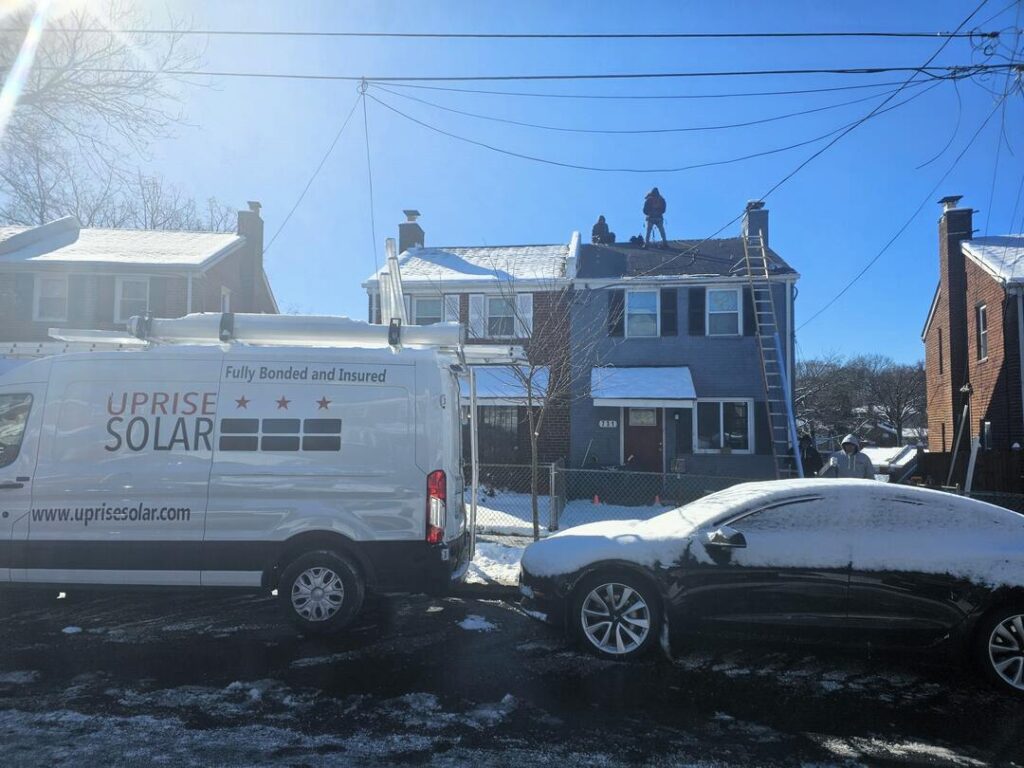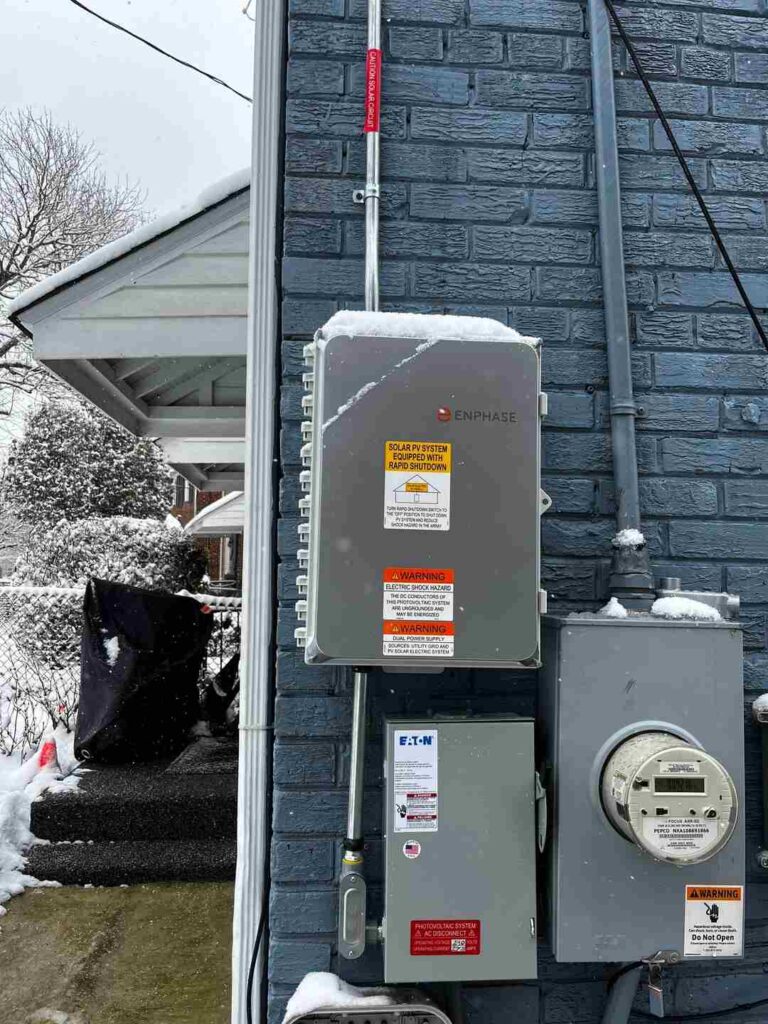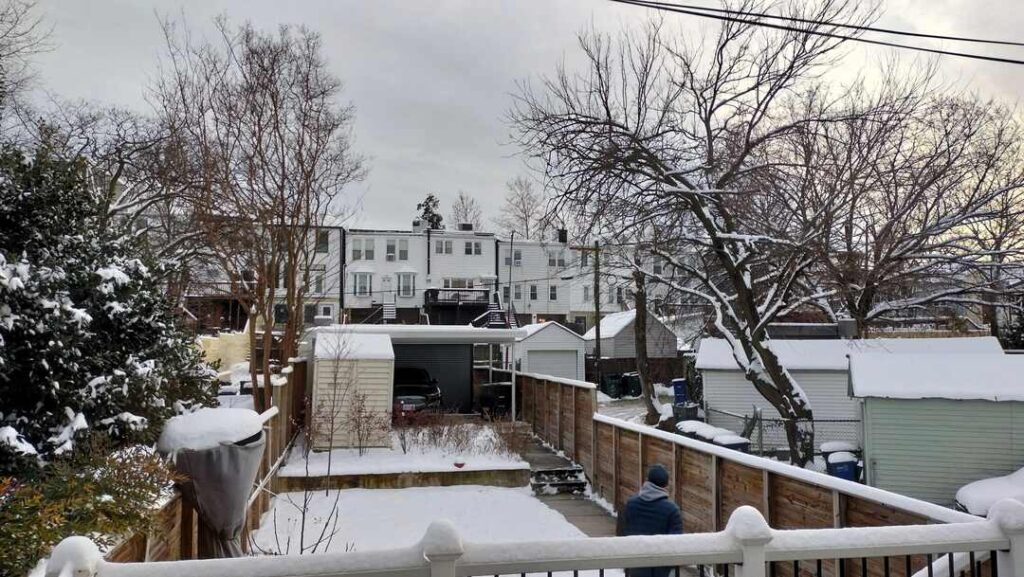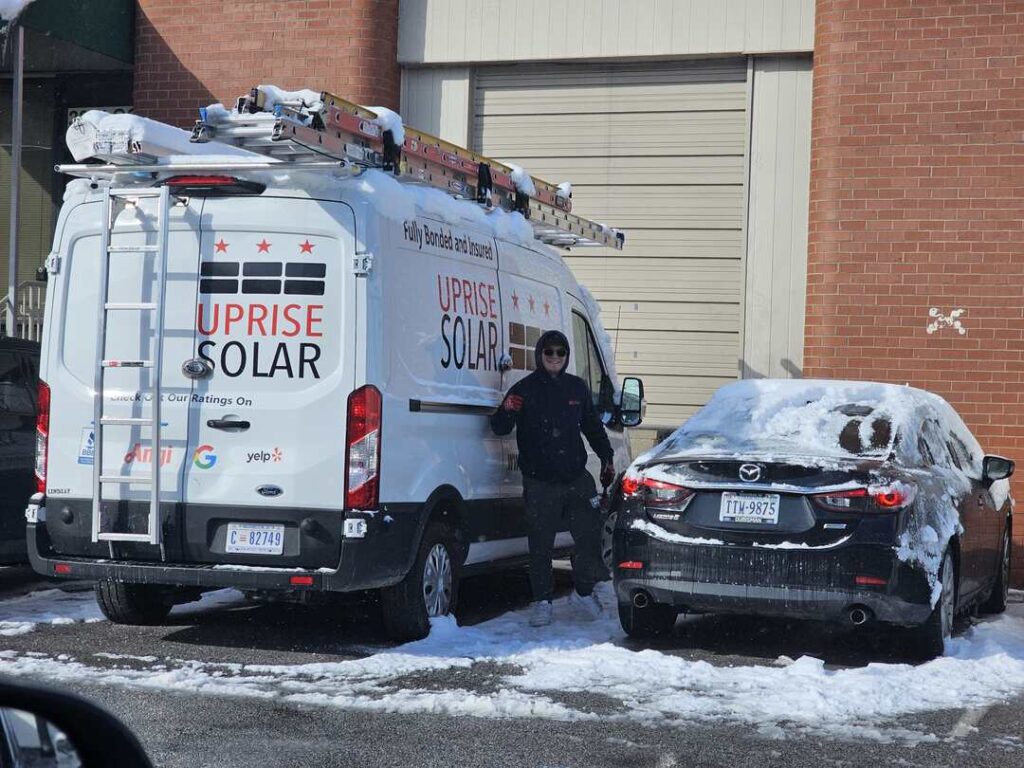As temperatures drop and we see flurries in the DMV, you may be wondering if the solar panels on your roof will still generate electricity. What happens when it snows or rains? Here’s what you can expect from solar in winter weather.

Can Solar Panels Generate Electricity When It’s Cold Outside?
Did you know solar panels actually prefer cold, sunny weather to warm, sunny weather? They operate more efficiently in cooler than hotter temperatures, because colder temperatures increase panels’ voltage. Higher voltages mean more electricity can flow. Hotter temperatures mean more resistance in electrical wires, so electricity can’t flow as easily. In colder temperatures, there is less resistance.
At this point you may be worrying about heat instead, but you don’t need to! Hotter temperatures don’t mean solar panels overheat, just that they’re slightly less efficient. Longer hours of daylight in summer mean your panels will still generate plenty of electricity, even more than they will in the winter. Panels that Uprise installs will work up to 185 degrees Fahrenheit, so a couple of muggy summer days of even 100 degrees won’t bother them. (They’ll work in temperatures as cold as -40 degrees.)
Okay, back to winter. So yes, solar panels will work efficiently in cold temperatures, but what about when it isn’t sunny?

Solar Panels In Cloudy or Wintry Weather
Solar panels work even when the sun isn’t shining directly on them. Think about the fact that you still need sunscreen on a cloudy day: light penetrates through the clouds. Solar panels won’t generate as much power on cloudy days as on sunny days, but they will continue to operate. The same is true for rainy days, with the added benefit that rain cleans off your panels for you.
Light can even penetrate ice and a dusting of snow. Once that snow starts to build up, however, the panels won’t be able to generate electricity. But resist that temptation to scrape snow off your panels! You don’t want to scratch the panels. (Plus, it may be icy and dangerous up on your roof.) Uprise typically installs black panels, and that dark color will attract heat, so the snow will melt off.
The Department of Energy says snow can clean solar panels as well, comparing the process to what happens when snow melts off a car windshield. Dirt on the glass protecting solar panels bonds with snow and gets washed away when the snow melts. The department says, “The anti-soiling properties of snow inherently make solar panels cleaner and able to reach higher efficiencies.”
One factor to consider with solar in winter is that there aren’t as many hours of sunlight in a day, and the sun is lower in the sky. So in the cooler temperatures, your panels will operate more efficiently, but they won’t entirely make up for those lost hours. However, they’ll still continue to generate power for your home, and you should still be receiving a break on your electric bill unless you’re using significantly more electricity. (If you want to learn more about how to conserve power in the winter, check out our recent blog post on the topic here!)
In fact, several northern states that tend to see more snow than the DMV rate near the top in the Solar Energy Industries Association’s state rankings (based on cumulative solar capacity installed), like New York (#8), New Jersey (#10), Massachusetts (#11), and Ohio (#14).

Other Common Winter Solar Questions
Here are some answers to some common questions about how solar works in the wintertime. And if you don’t see your question answered below, please feel free to reach out to Uprise!
Is Snow Too Heavy For Solar Panels?
Nope! Solar panels can handle multiple feet of snow at once and be just fine. Snow weighs around four pounds per square foot if it’s fluffy, and 13 pounds per square foot if it’s wet. In contrast, the solar panels Uprise commonly installs can withstand a maximum test load of 146 pounds per square foot. So no need to worry that snow is too heavy for the panels. Even if we’re hit with nearly 20 inches like 2010’s Snowmageddon, your solar panels can withstand the load.
Does Uprise Install Solar Panels In The Winter?
We sure do. Expect to see the Uprise truck rolling around town even in frigid temperatures! That said, it’s generally not safe to install solar while it’s actively snowing or raining. But once it stops, our crews can get back out there.

What If There’s A Winter Power Outage? Will My Panels Still Work?
Solar systems that are tied to the grid (which are all the systems Uprise installs) must disconnect to protect electrical workers solving the outage. The only way you can still get power from your solar panels is if you have battery backup. Then, your home will function essentially as its own mini microgrid, with electricity from your panels powering your home and any excess getting stored in your battery. But you won’t be able to send power to or draw power from the grid during a power outage.
How Can I See How Much Power My Panels Are Producing?
You can check out your solar panels’ performance in the Enphase App. Click on the Status icon at the bottom of your screen to see how much clean energy your panels are producing (and click ‘Live Status,’ near the top, for real-time data). Or click on the Energy icon to see production trends by seasons, or the Array icon to check out individual panels.
You can learn more about how to use the app in our blog post (midway through the article, in the monitoring section), or with Enphase’s explainer video.
Ready To Go Solar?
Don’t let winter slow you down! Reach out to the Uprise team for a conversation about solar for your roof here, or give us a call at (202) 280-2285. We’d love to help you go solar, summer or winter!
